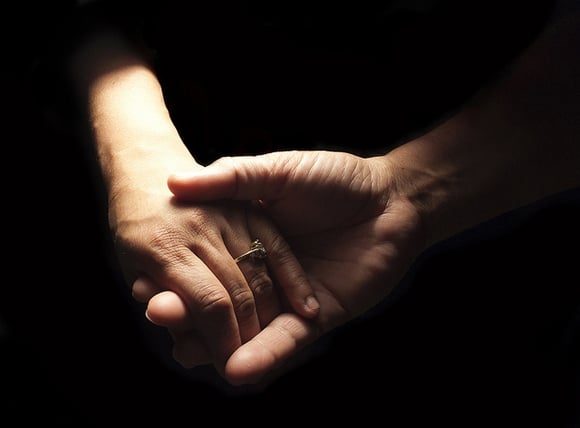The emotions of grief – sadness, feelings of loss, anger, abandonment, confusion, shock, fear, guilt, as well as deep physical manifestations of all the above, are common reactions to the death of someone you love, including a beloved pet. Grief can occur even when you lose someone who doesn’t die, but who is no longer part of your life.
 Image source: Alex on Flickr
Image source: Alex on Flickr
Other times we experience grief can be unexpected like when someone loses a limb or becomes immobile. A diagnosis of permanent or terminal illness can also cause feelings of grief. Parents can experience grief when children leave home — we might treat it lightly by calling it empty-nest syndrome – but for parents, facing that empty home can be devastating.
Dealing with these feelings is no easy matter; everyone must process them in their way. No-one can give you a nice, neat schedule for handling grief – it will take as long as it takes.
You can adopt some strategies that may help you cope a little better. They are not ever going to be a "one-size fits all" solution. You might try them and feel no better; that’s okay, you may not be ready to use them just yet.
External Grief Coping Strategies
Several ways of dealing with grief involve an outward-looking perspective. You can actively seek relief from sources outside of yourself. These can include:
Asking for help. This is important. No-one expects you to handle all the necessary arrangements by yourself. People often want to help, but don’t know what you need. Many hands make light work, and lots of small tasks add up to getting the work done. So ask.
 Image source: Melvin E on Flickr
Image source: Melvin E on Flickr
Talking to friends and family. Talking about a loved one who has died is often therapeutic. It helps to remind each other of the good memories associated with that person. There’s a reason for the old saying, “Laughter is the best medicine.” Some people feel it is disrespectful to smile or laugh after a death, but humans are conditioned to use emotion, whether it manifests as tears or laughter, consolation and release.
Having your family around with all those shared memories is a way of keeping your love of the one who has passed in the forefront. Grieving doesn’t mean pushing your love to one side. It is as important to your well-being as it was when the two of you were together. Don’t stop loving them.
Rely on your faith. If you are a member of a church or other religious group, you will have a lot of active support. Many others there will have gone through, or are still going through, what you are experiencing. Lean on them and, at the same time, try to give some comfort too. Helping others can help you.
 Image source: Premier of Ontario Photography on Flickr
Image source: Premier of Ontario Photography on Flickr
Become a member of a group. There are online groups for every type of support. For example, if you or someone close has lost a limb, you should be offered some resources to help deal with the psychological aspects of coming to terms with the loss. One of those may be an online group of people who are also facing the same challenges.
Create a personal good-bye. Think about how you could make the transition meaningful by creating your special ceremony. It has to be personal to you so could involve reading poetry, creating a shrine, writing a last letter, or perhaps playing music that was loved by the person who has gone. Allow it to be a celebration of your life together, rather than a mourning of their passing. You can either do this alone or involve your closest family and friends.
Internal Coping Methods
Grief can hit you when you are at your most vulnerable: when you are alone. You can’t be with others all the time, and at some point, you will have to face being alone with your thoughts and emotions. Having some mental tools available may not work right at the beginning, but a little later when the fog begins to lift, they can help point you towards recovery.
 Image source: Mike Schaffner on Flickr
Image source: Mike Schaffner on Flickr
Don’t push your feelings back down when they threaten to overtake you. If it means constant tears, then let them come. Suppressing emotions will simply prevent the natural grieving process to happen. Some people never cry even when dealing with extreme grief. They can present a calm and accepting face to the world. That’s normal too. However, when alone, you don’t have to do that; so bring the feelings into the open and examine them.
Releasing emotions is a continuous process that can move you towards acceptance. Acknowledge how you feel, thank the emotion for being part of your healing and then release it. You could visualize a bird being set free or pouring the feeling into a stream. The feeling will return, and that’s okay. Just repeat the process.
Have a regular small private ceremony. It might be a visit to a special place or a time of prayer or talking to the one who has passed. Writing in a journal could work for you. It is your safe place to express your thoughts. Making it a regular thing can give a little structure and routine to the process of grieving. It’s like giving yourself permission to grieve. This can go on for as long as necessary.
Dealing with Anniversaries
Decide in advance how you will deal with anniversaries. Some people feel that dates aren’t important; for others, they dread a traumatic re-living of the cause of their grief. It might help to arrange an annual family commemoration or perhaps a simple personal ritual. As before, if you need help, ask for it. You are not a nuisance, and people do understand as most have experienced loss at some time.
 Image source: Daniel Zedda on Flickr
Image source: Daniel Zedda on Flickr
It may be useful for you to "re-visualize" the turning of the year by seeing time as a spiral, so instead of looking down and back, you are looking up and forward. This means that you see yourself attaining a new level of acceptance each time an important anniversary comes around.
Resources for Coping with Grief
Your doctor, grief counsellor, pastor or health professional will be able to offer further help and resources to deal with your grief. You never have to feel you have nowhere to turn.
Dealing with the loss of a loved one:
http://www.helpguide.org/articles/grief-loss/coping-with-grief-and-loss.htm
Coping with the death of a pet:
http://www.helpguide.org/articles/grief-loss/coping-with-pet-loss.htm
When children leave home:
http://www.griefandsympathy.com/emptynestsyndrome.html#axzz3iUkmi3YA
Coping with amputation:
http://www.cdha.nshealth.ca/amputee-rehabilitation-musculoskeletal-program/patients-families-amputee-rehabilitation/coping-your-

